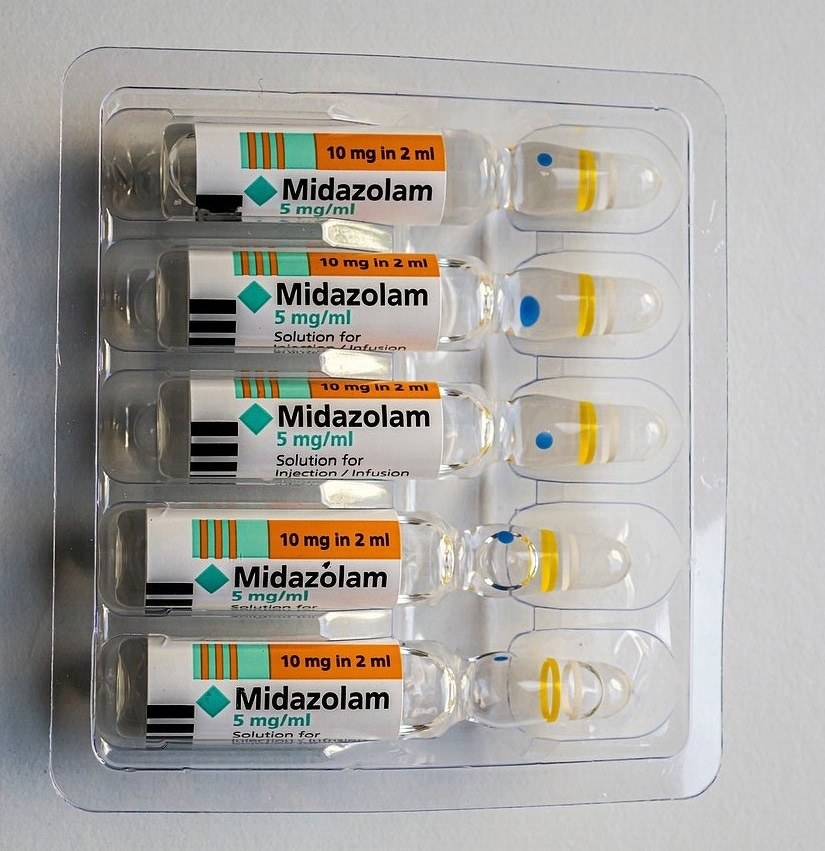What is this Midazolam Injection?
Midazolam Injection (MID ay zoe lam) is used to treat anxiety and cause drowsiness before and during a procedure. It works by helping your nervous system calm down. It belongs to a group of medications called benzodiazepines.
This medicine may be used for other purposes; ask your healthcare provider or pharmacist if you have questions.
COMMON BRAND NAME(S): Versed
What should I tell my care team before I take this medication?
They need to know if you have any of these conditions:
- COPD (lung or breathing disease, such as chronic bronchitis, or emphysema)
- Dehydration
- Glaucoma
- Heart failure
- High or low levels of electrolytes, such as magnesium, potassium, or sodium, in your blood
- History of substance use disorder
- Kidney disease
- Midazolam injection price
- Midazolam Injection Route
- An unusual or allergic reaction to midazolam, other benzodiazepines, benzyl alcohol, foods, dyes, or preservatives
- Pregnant or trying to get pregnant
- Midazolam Injection dose per kg
- Breast-feeding
How should I use this midazolam injection?
This medication is injected into a muscle or vein. It is given in a hospital or clinic setting.
Talk to your care team about the use of this medication in children. While this medication may be prescribed for children for selected conditions, precautions do apply.
Overdosage: If you think you have taken too much of this medicine, contact a poison control centre or emergency room at once.
NOTE: This medicine is only for you. Do not share this medicine with others.
What if I miss a dose? Midazolam Injection Brand Name
This does not apply. This medication is not for regular use.
What may interact with this medication?
Do not take this medication with any of the following:
- Boceprevir
- Certain medications for fungal infections, such as ketoconazole and itraconazole
- Delavirdine
- Idelalisib
- Lonafarnib
- Opioid medications for cough
- Sodium oxybate
- Telaprevir
This medication may also interact with the following:
- Alcohol
- Antihistamines for allergy, cough and cold
- Certain antibiotics, such as clarithromycin, erythromycin
- Certain medications for anxiety or sleep
- Certain medications for blood pressure, heart disease, and irregular heartbeat
- Certain medications for depression, such as amitriptyline, fluoxetine, and sertraline
- Certain medications for seizures, such as phenobarbital, primidone
- Cimetidine
- General anaesthetics, such as halothane, isoflurane, methoxyflurane, propofol
- Medications that relax muscles for surgery
- Opioid medications for pain
- Phenothiazines, such as chlorpromazine, mesoridazine, prochlorperazine, thioridazine
This list may not describe all possible interactions. Give your healthcare provider a list of all the medicines, herbs, non-prescription drugs, or dietary supplements you use. Also, tell them if you smoke, drink alcohol, or use illegal drugs. Some items may interact with your medicine.
What should I watch for while using this medication?
Visit your care team for regular checks on your progress.
This medication may affect your coordination, reaction time, or judgment. Do not drive or operate machinery until you know how this medication affects you. Sit up or stand slowly to reduce the risk of dizzy or fainting spells. Drinking alcohol with this medication can increase the risk of these side effects.
If you are taking another medication that also causes drowsiness, you may have more side effects. Give your care team a list of all medications you use. Your care team will tell you how much medication to take. Do not take more medication than directed. Get emergency help right away if you have problems breathing or unusual sleepiness.
If you or your family notice any changes in your behaviour, such as new or worsening depression, thoughts of harming yourself, anxiety, other unusual or disturbing thoughts, or memory loss, call your care team right away.
Talk to your care team if you wish to become pregnant or think you might be pregnant. Talk to your care team before breastfeeding. Changes to your treatment plan may be needed.
What side effects may I notice from receiving this medication?
Side effects that you should report to your care team as soon as possible:
- Allergic reactions—skin rash, itching, hives, swelling of the face, lips, tongue, or throat
- CNS depression—slow or shallow breathing, shortness of breath, feeling faint, dizziness, confusion, trouble staying awake
- Low blood pressure—dizziness, feeling faint or lightheaded, blurry vision
- Tremors or shaking
- Midazolam injection indication
Side effects that usually do not require medical attention (report these to your care team if they continue or are bothersome):
- Agitation, feeling irritable or restless
- Dizziness
- Drowsiness
- Headache
- Hiccups
- Nausea
- Midazolam Injection Dose
- Vomiting
This list may not describe all possible side effects. Call your doctor for medical advice about side effects. You may report side effects to the FDA at 1-800-FDA-1088.
Where should I keep my medication?
This medication is given in a hospital or clinic. It will not be stored at home.
NOTE: This sheet is a summary. It may not cover all possible information. If you have questions about this medicine, talk to your doctor, pharmacist, or health care provider.





Wilda –
Good day I am so happy I found your website
Elise –
Received after 4 days
Tamie –
I particularly liked being notified via emails &/or text. This facilitated our need for a quick response.
Agustin Baum –
I have recommended Mandell’s to other individuals going through their shipping methods